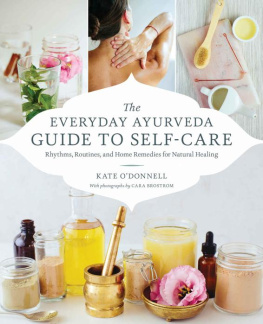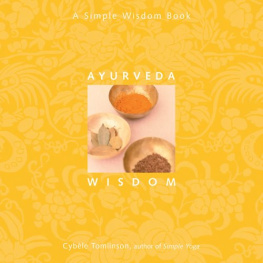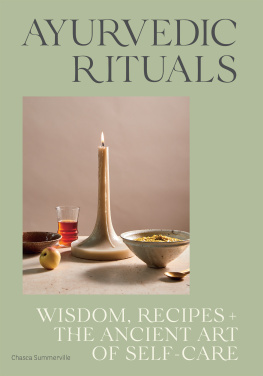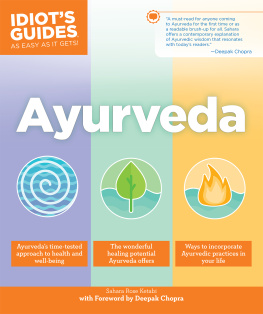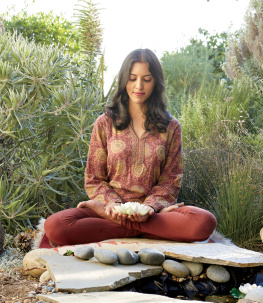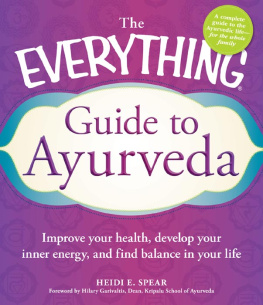AUTHORS NOTE

More than twenty years ago, I journeyed to India on a quest for self-knowledge. I wandered the subcontinent with a backpack, delving into Indian culture, Vedic philosophy, and yoga practice. It was my struggle with parasites that brought me to Ayurveda. The diet and lifestyle practices I learned from doctors in India became my path of self-reliant healing. In this guide to self-care, I offer a process, based on my own experiments with Ayurvedic living, for befriending your body and discovering how best to care for it. Its a unique journey to discover what works for you. The launchpad is an ancient body of wisdom, the fruits of collected observations from thousands of years of human trial and error. Join me, dear reader, for a journey into self and into care. Its totally worth your time.
This book offers a new way to think about your health and understand the cause-and-effect relationship between your body, your environment, and your lifestyle. Taking care of yourself is about maintaining good health through a steady practice of self-observation. Ayurveda works when you pay attention to your Self. The information you gain about what makes you glow is pure gold. Think about caring for plants and pets. You have to pay attention to themfigure out what kind of food they like, how much sun and water they needand watch how they react to changes. Everybody knows you have to walk a dog and water a plant, but how often? Does it change as they age or at different times of year as the amount of sunshine and occurrence of rain shift? Theres no judgment if a plant likes less sun or needs fresh soil. And theres no need to judge what makes you thrive, such as needing more rest than exercise or the other way around. Theres true intimacy, acceptance, and joy in this kind of self-discovery.
What is special about Ayurveda is the recognition of the central relationship between us and our environment. Human beings are microcosmic members of the macrocosm, and the laws that govern nature govern us as well. For example, waking with the sun and sleeping in the dark have beneficial effects on our health. Modern science is presently fleshing out the details of this phenomenon through the study of circadian rhythms and the effects these rhythms have on our mental well-being, hormones, digestion, and so on.
Ayurveda also takes into account our human nature and the role our minds, emotions, and energies play in our health. There is a subtle reality inside of us that cant be seen or measured but certainly has its effects. Ayurvedic science teaches the art of daily living, of being an integrated, whole person among the needs of job, family, home, and the spiritual heart. Its absolutely possible for anyone to cultivate higher states of health and happiness through the Ayurvedic lifestyle. Ive been observing the healing potential of this traditional medicine in all sorts of people, in all sorts of ways, for twenty years. Lets see what it can do for you.
Your Friend,
Kate ODonnell
INTRODUCTION
The Ayurvedic Definition of Health

Swastha literally means to be seated in the self and is loosely defined as health. This word not only gives us clues about how the system of Ayurveda works to support a long and happy life but also defines the true essence of health. Being seated in the self is like being comfortable in your own skin. To feel at ease in a body requires both physical health and a philosophical sense of OK-ness. Being OK with who we are, with the body weve been given, and with the process of becoming is to be seated in the self. With imbalances like a sour stomach or a disturbed mind, it is more difficult to feel at home in the moment. Its easier to be here now when you feel clear. The ancient sages who began the path of Ayurveda pointed out certain aspects of life that are important in the maintenance of swastha.
Ayurveda is defined as the science of life, but what is life? The root word ayuh does not mean simply life; it actually describes four aspects that, when combined, form what we call life: the body, the senses, the mind, and the soul. Maintaining good health requires paying equal attention to each of these aspects and respecting their interdependence. Physical wellness, mental wellness, and spiritual wellness are intertwined in this paradigm. To ignore any aspect of life would be to diminish the whole.
The Ayurvedic definition of health goes further to describe the components of health. To be considered a healthy person, each of the following needs to be in balance:
The functional compounds in the body responsible for movement, transformation, and cohesion (doshas)
Digestive fire (agni)
The seven bodily tissues (dhatus)
The production and elimination of waste (malas)
The sensory and motor organs (indriyas)
The mind (manas)
The soul (atman)
In The Everyday Ayurveda Guide to Self-Care,

